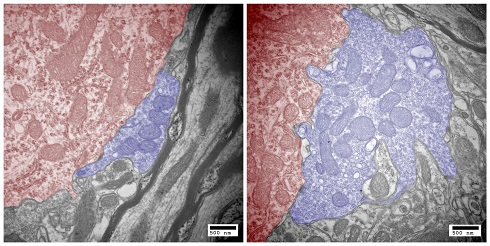In mice, prolonged exposure to sound altered cells connected to the brain.
BUFFALO, N.Y. -- Cells that relay information from the ear to the brain can change in significant ways in response to the noise level in the environment.
That's one major finding of a study out today in the Early Edition of the Proceedings of the National Academy of Sciences.

A synapse formed by the auditory nerve in a normal mouse (blue, left), and in a mouse exposed to noise for a week (blue, right). Credit: Amanda M. Lauer, Johns Hopkins University School of Medicine.
Expose the cells to loud sounds for a prolonged period of time, and they alter their behavior and even their structure in a manner that may aid hearing in the midst of noise. End the ruckus, and the cells change again to accommodate for quieter environs.
"The brain is amazingly adaptable: The way it receives information can change to accommodate for different conditions, and this is what we see in our research," said Matthew Xu-Friedman, PhD, an associate professor of biological sciences at the University at Buffalo. "What we see is that the cells in the auditory nerve adjust. They change themselves so they can respond to a different, heightened level of activity."
The research, conducted on mice, was led by Xu-Friedman and completed by a team at UB and the Johns Hopkins University School of Medicine. The study tested how the animals responded to living in a noisy habitat for a week, and how the noise-exposed animals then reacted to a quiet environment.
Auditory nerve cells as frugal savers
When the ear is exposed to a noise, cells in the auditory nerve release chemicals called neurotransmitters. These chemicals tell the brain that the ear has been stimulated. That's how we hear.
One problem that can complicate this process is depletion of neurotransmitter: Each cell has a limited supply of the chemicals, and when a cell runs out, it loses its ability to contact the brain. This becomes an issue in noisy environments, where constant stimulation puts cells at risk for using up neurotransmitter too fast.
Xu-Friedman believes that the adaptations that mice exhibited in the new study are geared toward addressing this complication.
For a week, the animals were exposed to noise akin to that made by a lawn mower or hair dryer.
In response to this provocation, the animals' auditory nerve cells became more frugal, discharging a smaller proportion of their neurotransmitter reserves in response to stimuli than comparable cells in animals reared in quieter habitats. This meant the noise-exposed mice would be less likely to deplete neurotransmitters while processing background noise, and more likely to have chemicals available for signaling the brain when new sounds appeared.
"The changes could help the animals deal with loud conditions and not go deaf," Xu-Friedman said. "Instead of draining your limited supply, you save some of it so you can continue processing new stimuli."
In addition to altering their behavior, the animals' auditory nerve cells also changed their structure, enlarging their synaptic endings. This is the region of the cells where neurotransmitters are stored, and the increase in size implies that the cells were upping their inventories of the chemicals, Xu-Friedman said.
Reverting to normal behavior
When the researchers placed the noise-exposed mice into a quiet habitat, the animals' auditory nerve cells adapted, once again, to new conditions.
The cells released neurotransmitters at a level akin to mice that had never been in loud environs.
These results demonstrate the brain's adaptability, said Xu-Friedman.
"We think we may have found another form of homeostasis," he said. "If the brain needs to process information under many different conditions, it's helpful if there's a set of rules to follow, ways to behave when activity is high and when activity is low. That appears to be happening with regard to these cells in the auditory nerve."
The study was funded by grants from the National Institutes of Health, National Science Foundation and Dalai Lama Trust Fund.
Xu-Friedman's co-authors on the paper were Tenzin Ngodup and Jack A. Goetz in the Department of Biological Sciences at UB; Brian C. McGuire and Amanda M. Lauer in the Center for Hearing and Balance and Department of Otolaryngology-Head and Neck Surgery at Johns Hopkins University School of Medicine; and Wei Sun in the Center for Hearing and Deafness and Department of Communicative Disorders and Sciences at UB.
Source: https://www.eurekalert.org/pub_releases/2015-05/uab-hnc050515.php

